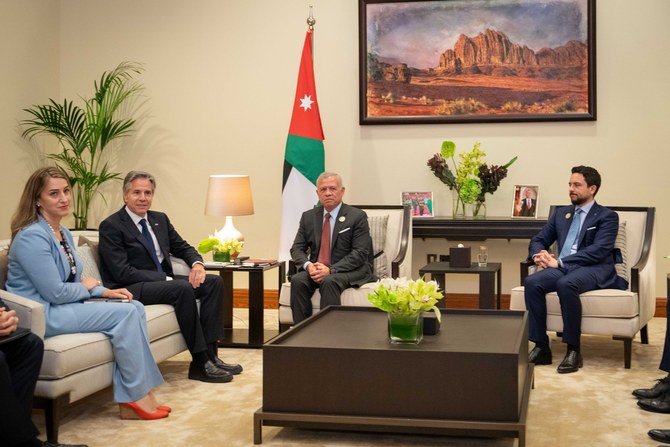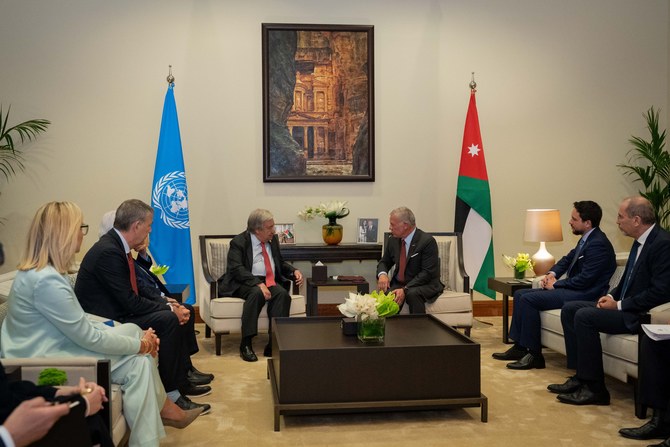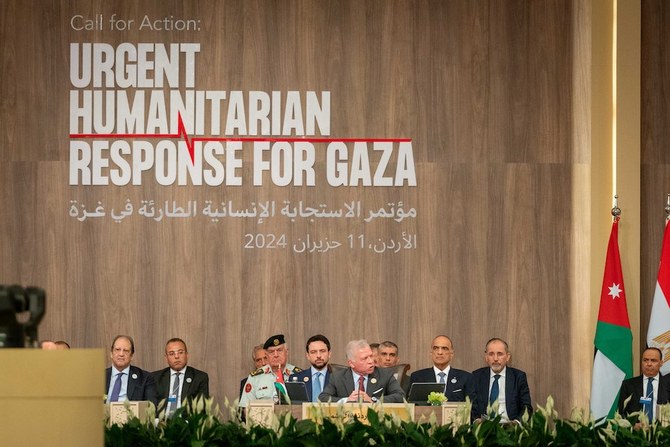DUBAI: Jordan’s King Abdullah said on Tuesday that humanitarian access to the Gaza Strip could not wait for a ceasefire and that Palestinians in Gaza were facing death and devastation.
Speaking at an emergency international conference at Jordan’s King Hussein bin Talal Convention Center, the king said: “We stand today at a critical juncture in human history. Our collective consciousness is being tested by the unfolding catastrophe in Gaza. Our very humanity is on the line.”
The Call for Action: Urgent Humanitarian Response for Gaza Conference, held at the invitation of King Abdullah, Egyptian President Abdel Fattah El-Sisi and UN Secretary-General Antonio Guterres, aimed to strengthen the international community’s response to the humanitarian disaster in the Gaza Strip.
King Abdullah said: “For eight relentless months, the people of Gaza have been suffering from death and devastation that have far surpassed any conflict in over 20 years.
“The specter of famine looms large. Trauma is ever-present, the effects of which will remain for generations. And every corner of Gaza is marred by ruin.
“The international humanitarian response in Gaza has been severely lacking, with the delivery of aid facing obstacles at every level. Humanitarian access cannot wait for a ceasefire and cannot be subject to the political agendas of any party.”
The king stressed the need for a strong coordination mechanism that included all parties on the ground, and effective and comprehensive disengagement between actors to ensure the ability of relief agencies to work, organize, and perform their duties safely, sufficiently and sustainably.
The war in Gaza has caused a humanitarian catastrophe for over 2.3 million Palestinians, leading to widespread famine, psychological suffering, and massive destruction. Access to food, water, housing, and medicine has become almost non-existent.
King Abdullah held talks with US Secretary of State Antony Blinken on the sidelines of the meeting. They discussed the recent ceasefire and hostage release deal that has been proposed by the Biden administration.
The US State Department said in a statement: “Blinken thanked King Abdullah for Jordan’s support for the deal and leadership in facilitating the delivery of lifesaving humanitarian assistance to Palestinians in Gaza.”
It “reiterated the US commitment to achieving durable peace and security in the region.”
The king noted the important role of the US in supporting the humanitarian response in Gaza, but “warned against undermining the efforts of UNRWA (UN Relief and Works Agency) in Gaza, adding that it represents a lifeline for nearly 2 million Palestinians in the sector,” the Jordan News Agency reported.
King Abdullah held a separate meeting with Guterres to discuss the role of UN agencies’ humanitarian response in Gaza, and called for an unimpeded flow of assistance to the region.
He also called for an immediate and permanent ceasefire in the besieged Palestinian territory which ensured the protection of civilians, and discussed ways to continue support for UNRWA so it could continue to carry out its work.
The Jordanian monarch also held a coordination meeting with El-Sisi and Palestinian President Mahmoud Abbas, in which they discussed the flow of aid, the ceasefire deal, and reaching “a just and comprehensive solution to the Palestinian issue on the basis of the two-state solution,” Petra said.
It added: “The king said international recognition, especially by European countries, of the state of Palestine is a positive step that must be built on.”
The three leaders warned against extremist settler attacks on Palestinians in the West Bank, and violations of Muslim and Christian holy sites in Jerusalem.
GCC Secretary General Jasem Albudaiwi during the same event condemned the Israeli occupation forces for their irresponsible and inhumane practices, which have had severe consequences for regional security and global stability.
In his speech, he reiterated the need for an immediate halt to the Israeli military operations that have disregarded humanitarian and legal boundaries.
Albudaiwi also strongly condemned the displacement of civilians and the targeting of hospitals, places of worship and UN facilities, and reaffirmed the “unwavering support of the GCC for the rights of the Palestinian people and condemned the aggression of the Israeli occupation forces.”
He lauded European countries who recently recognized the State of Palestine and urged others to follow suit, emphasizing the importance of respecting international laws and promoting human rights.

























